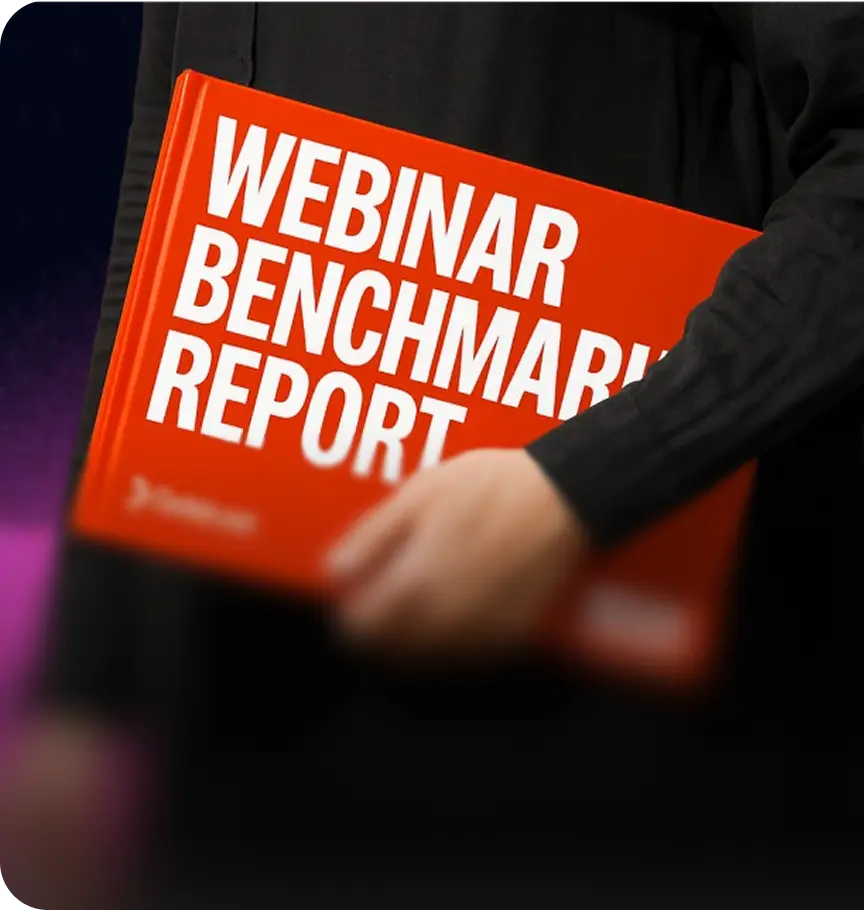What Are the Core Virtual Event Planning Roles and Responsibilities?

Table of Contents
Maximize Your Marketing ROI
Join 10,000 other marketers already getting the best tips on running engaging events that boost pipeline and create raving fans.
There’s a saying, ‘Teamwork makes the dream work’.
And when it comes to virtual events, we couldn’t agree more. From the right speakers delivering the best content, to an energizing host, and a switched-on tech team to tie it all together — any true event pro will tell you that if you want results, riding solo just isn’t an option.
To produce the best virtual events, you need one hell of a team. And each member needs to know their remit inside and out.
To help you select and onboard your rockstar lineup, we’ve pinpointed the 14 core event planning roles, what makes each one important, and the tasks, skills, and responsibilities required to make sure your next event is a win.
If you’re ready to assemble a dream team for your next virtual event, you’re in the right place!
Here’s what we’ll cover:
- Virtual event planning roles: The who’s who
- The content roles
- The tech whizzes
- The revenue squad
Virtual event planning roles: the who’s who
Any event you’ve ever attended has had a team of trained pros putting in 110% behind the scenes.
The same is true for virtual events. The only difference is that this time, the “scenes” are digital.
Most event teams have between 2 to 5 employees, so you’re likely to have more tasks and responsibilities than people. This means you’ll need to be super clear on how you define each team member’s role.
Let’s dive deeper into the virtual event team roster to see what each of those roles are all about.
The content roles
These first seven event roles are all about content creation and moderation. Because, to put it in the words of B2B marketing pros like Smartling’s Adrian Cohn, “It all starts with content.”
Before you can even think about details like which sessions will be live vs. recorded or roundtable vs. Q&A, you’ve got to know what your audience wants and who will be responsible for delivering it.
Virtual event planning role #1: the promo pro
Even with big-name speakers, epic engagement options, and cutting-edge content, your event is nothing if no one shows up for it.
That’s where your promo pros come in.
In the weeks (or even months) before the event, these switched-on networkers are speaking with sales to find out which accounts need to be there, which sessions are most likely to spark their interest, and how best to reach them.
- Role: To market your event, build the hype and make sure registrants actually show up.
- Key responsibilities: To get the word out about your event, own the registration process, and get those attendance numbers up!
- Must-have skills: A multi-channel marketing pro, who understands the company’s Account-Based Marketing (ABM goals), event angle and attendee motivations.
Virtual event planning role #2: the organizer
If your brand is hosting an event, you’re going to need someone to, well...host!
Whether you opt for an in-house or external expert for this role, make sure they understand your messaging on a deep level and are up to the task of showcasing your content.
- Role: Be the calm face of the event — the person attendees will remember.
- Key responsibilities: To keep the event ticking along at the right pace, introducing new sessions and speakers, bridging those awkward silences, and keeping the audience engaged.
- Must-have skills: Communicator, high energy, organized yet flexible, can improvise, manage time, and can keep cool under pressure.
Virtual event planning role #3: the speakers
While some of your content may be pre-recorded, a lot of it might also be live.
And if a keynote, roundtable or Q&A are on the agenda, you’re going to need some enigmatic speakers who know how to keep the audience on the edge of their seats.
Whether they’re delivering live or recorded content, your speakers are the lifeblood of the event, so choose carefully.
- Role: To deliver content, answer questions, and help deliver a compelling brand story.
- Key responsibilities: Keeping the audience interested, educating attendees on the event topic and being a key ambassador for your company.
- Must-have skills: Charisma, confidence, positivity, agility, personable and persuasive.
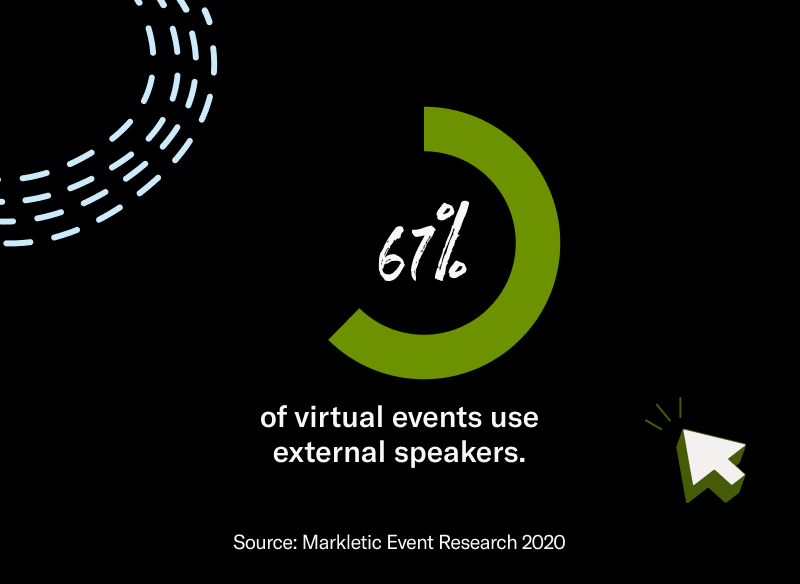
Virtual event planning role #4: the content creator
From keeping attendees engaged pre-session to having the peace-of-mind of knowing there’s backup content there just in case — there are many reasons virtual event planners don’t rely solely on live content.
When curating a balance of live and pre-recorded sessions, you’re going to need:
- Plug and play pre-prepped content that uploads seamlessly.
- Well-produced decks and videos to use alongside your live speaker sets.
The person (or people) responsible for assembling this content may be part of your internal team, or could be an external partner like a video agency. Whatever the case, you’ll need to make sure you’ve got the right people in the right seats with this role, because your content depends on it.
- Role: Create swoonworthy content ahead of the event.
- Key responsibilities: Understanding the event aims and customer needs and creating pre-recorded content that makes people want to stick around.
- Must-have skills: Can grasp and meet both business and attendee needs, has video/writing/photography proficiency and a creative and engaging tone.
Virtual event planning role #5: the moderator
As virtual event platforms have advanced, the options for networking, interacting and engaging with customers have gotten way better. But if you’re going to unleash the gateway to conversation, you’re going to need someone to help keep it in check.
- Role: Monitor and initiate all interactions. Keep the audience engaged.
- Key responsibilities: Maintain, moderate and initiate group sessions and direct chats, as well as checking poll results, collecting Q&A submissions and choosing which attendees to bring onto the virtual stage.
- Must-have skills: A multi-tasker with strong business acumen, an engaging disposition, has basic tech capabilities and is a conversation starter.
Virtual event planning role #6: the event stage manager
Multiple sessions can mean multiple speakers/entertainers.
That’s a lot of moving parts. If your event is longer than a couple of hours and predominantly live, you’re going to want a stage manager.
- Role: Manage speakers, entertainers, and any other live content providers.
- Key responsibilities: Make sure presenters understand the technology, are on stage at the right time, have answers to all their questions and are getting the support and feedback they need.
- Must-have skills: Organized, a strong negotiator, great time management, problem-solver, quick-thinker, leader, have basic tech capabilities and patience.
Virtual event planning role #7: the entertainment
If you’ve got the budget, this is a great role to outsource.
Hire a big-name speaker, book a band, organize a workshop, play a movie marathon, curate a digital tour — the options are endless!
- Role: Liven up the audience and give attendees something to remember.
- Key responsibilities: Engaging the audience, keeping them inside the event, and producing the wow-factor that makes the event (and your brand) memorable.
- Must-have skills: Talent, confidence, authority, flexibility, communication, personality and can read the room and adjust as needed.
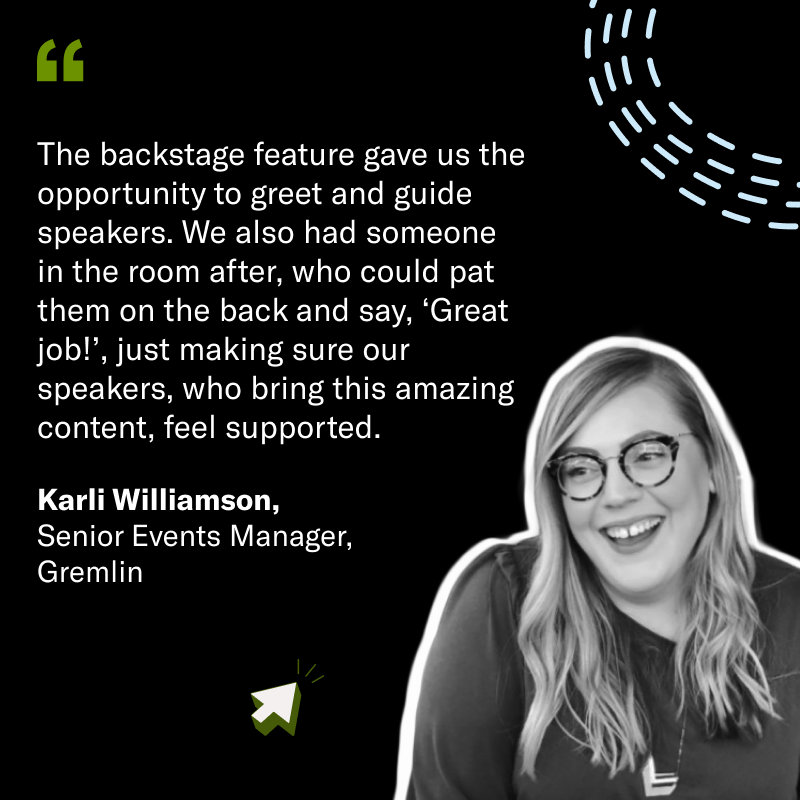
The tech whizzes 👩💻
It goes without saying that the main difference between an in-person and virtual event is the technology.
The good news is, you don’t need to go on the hunt for your own full stack virtual event developer. But you do need a tech-savvy team that knows how to keep the event running smoothly.
Here are the key tech-related roles to think about for your next virtual event.
Virtual event planning role #8: the designer
Hosting a virtual event is about way more than just sharing your knowledge and content. It’s about boosting your brand, becoming industry thought leaders, and leaving a lasting impression on your attendees.
For that, you’re going to need a stellar design team to help bring your event branding to life from start to finish.
- Role: Design a fully bespoke virtual event to amplify the brand.
- Key responsibilities: Incorporating brand guidelines across every element of the event: brand colors, logos, fonts, imaging, messaging, etc.
- Must-have skills: In-depth understanding of your branding and the message it needs to convey.
Virtual event planning role #9: the technician
We’ve all been there. A delayed connection. No audio. A screenshare fail. And, honestly, it’s just a little awkward. 😳
If you’re scrimping on any event roles, make sure it’s not this one.
- Role: Keep the event running smoothly from a technology perspective.
- Key responsibilities: Checking all equipment is event-ready: speakers and attendees can connect, videos are viewable, audio is listenable and security is sorted.
- Must-have skills: Problem solver, tech pro, communicator, quick thinker, innovative, thorough, efficient and organized.
Virtual event planning role #10: the post-production team
Don’t let your event's success end when your event does.
Keep it rolling by reusing the awesome content you presented. Re-package and repurpose your event content to leverage your results, think: social channels, as a blog, in emails, at future events and beyond.
- Role: Repurpose event content to boost traffic and leads following the event.
- Key responsibilities: To produce high-end videos (or written content) from your epic event to create that ‘I wish I was there’ moment.
- Must-have skills: Video producer, marketer, content leader, strategist and someone who has an understanding of the channels and content that work best for you and your customers.
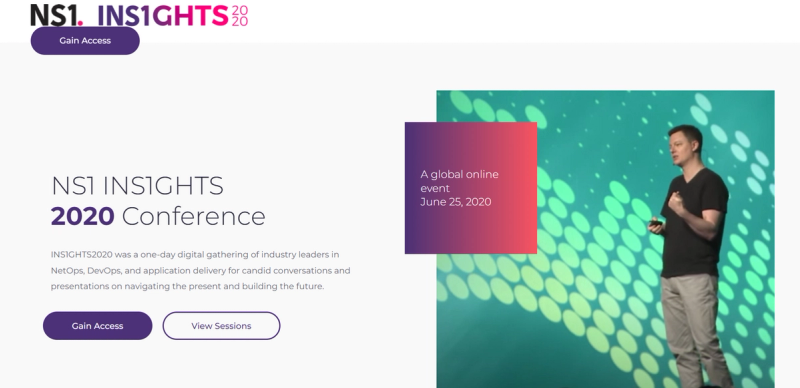
After NS1’s epic Insights event was over, they made their must-listen sessions available online. They also added a sign-up step to boost their lead gen efforts.
Virtual event planning role #11: the platform partner
If you’re serious about taking your event strategy to new heights, you’re going to need a next-level virtual event platform to get you there.
Finding the right platform may fall under the purview of the technician, the designer, or the event marketing leader, but whoever’s job it is — make sure they know exactly how all the tools in your martech stack connect to produce results long after the event.
And don’t forget to always do your research and dive deep into each of the data and engagement features on offer.
- Role: Provide an online venue to host the event.
- Key responsibilities: Offer support, expertise, and bespoke functionalities to help optimize the experience for attendees and utilize attendee data post-event.
- Must-have skills: Data-savvy, customer-centric, flexible, supportive and applies user feedback.
💡Tip: Looking for a solution for your next event? Check out our free guide to virtual conference platforms for tips on what to look for in a vendor and features that you won’t want to miss.
The revenue squad
The urge to kick back and relax after the close of a perfectly executed virtual event is very real. But for many revenue-minded event marketers, this is where the real work begins.
Because while running a virtual event your customers love is always awesome — raking in the results is even better.
Virtual event planning role #12: the data cruncher
One of the major perks of hosting virtual events is the incredible account-level data you can capture — the sessions an attendee visited, how long they stayed, polls they answered, booths they visited — it’s kinda epic.
But if you really want to harness that data and transform it into revenue, you’ve got to make sure it integrates seamlessly with the rest of your MarTech stack.
- Role: Drill down on data insights and create deal-closing follow-ups.
- Key responsibilities: Ensure data flows directly from the virtual event platform into the CRM. Analyze trends, assess pipeline velocity, create insight-fueled email campaigns, and communicate to the sales team.
- Must-have skills: Data-focused, analytical, communicator, process-driven, and tech-smart.
Virtual event planning role #13: the sales star
90% of companies with an ABM approach see an increase in average deal size, and once you’ve got the right event data at your fingertips, you can gun for those same results.
With the right sales team — and a stellar handoff between them and your event marketing team — you’ll be ready to transform attendee insights into real revenue for the business.
- Role: Combine the event data with account-level insights on attendee needs and facilitate 1:1 conversations following the event.
- Key responsibilities: Provide intel on what type of content attendees are after and who should receive invitations. Help arrange 1:1 sessions, producing engaging demos, and following up after.
- Must-have skills: Analytical, personable, confident, strong negotiator and communicator.
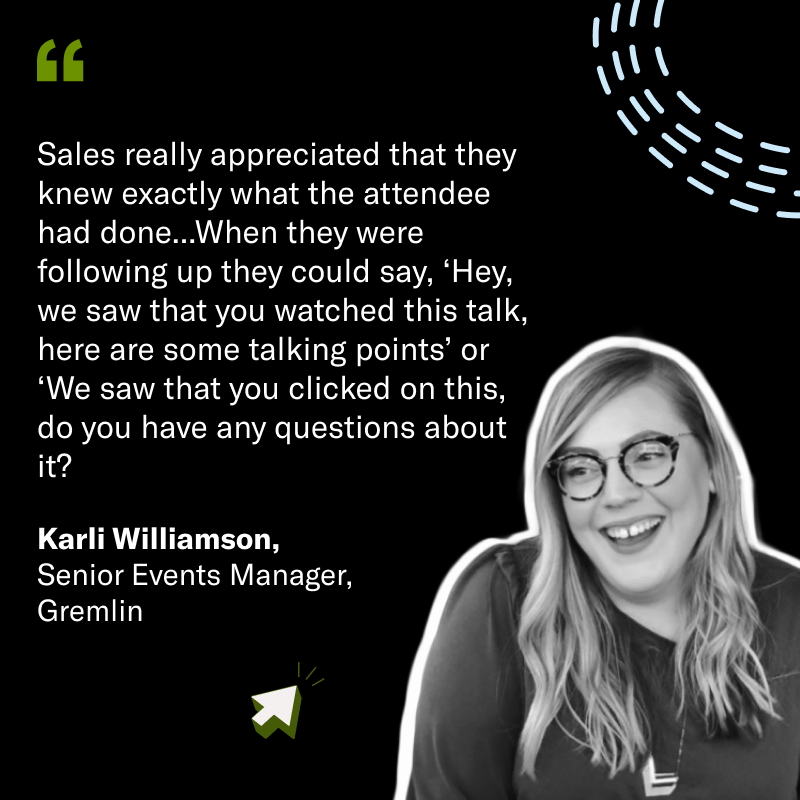
Virtual event planning role #14: the event marketing leader
Every ship needs a captain and in a virtual context, this is the person who keeps it all in check and on time.
And honestly, it's probably the most challenging role of all.
- Role: Hold the vision of the event, manage the entire event team, and take accountability for everything that happens with the event on the big day.
- Key responsibilities: Assign team roles, track team progress, align the moving parts, watch those deadlines, put out any fires and communicate everything clearly to everyone involved (before, during and after). So yeah, just that! 😅
- Must-have skills: Personable, authoritative, flexible, organized, a listener, a natural leader, an incredible communicator, experienced at problem solving, decision-making and keeping calm under pressure.
Delegation + teamwork + communication = virtual event management success ✨
When it comes to the high-stakes task of assembling your virtual event dream team, it’s easy to feel overwhelmed.
Remember to keep your roles distinct, even if you’re doubling up. Make responsibilities clear from the outset. And align people’s natural skills to the roles you assign them.
Above all, remember to keep those communication channels open so that it’s easy for your team to stay in the loop. Because behind every awesome virtual event, there’s a team of very tired event-marketers working like wild to pull it off. 👏🏽

Transform Your Video Marketing with AI
Stay In Touch
Platform
Resources
© 2025 Copyright Goldcast, Inc. All rights reserved.



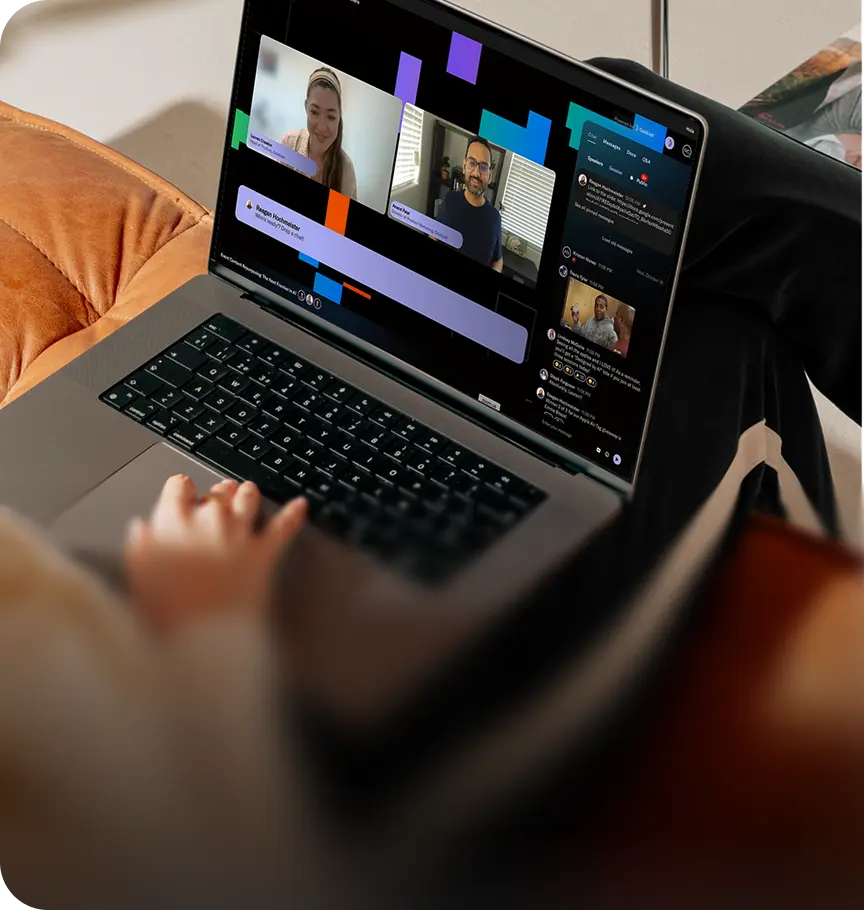

 Upcoming Events
Upcoming Events Event Series
Event Series On-Demand Events
On-Demand Events